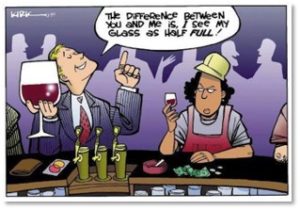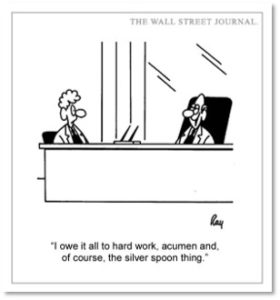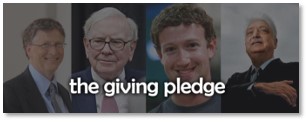A lot has been written about privilege in the last year and I have thought about it a great deal as well. The privilege that preoccupied us in 2017 fell into two areas. Today I will talk about the one that comes to mind first.
Financial Privilege
The 95% of us that do not belong to the super rich, look at the top 5% and, of course, the One Percent and find them privileged.
One look at The Wall Street Journal’s “Mansion” section every Friday confirms this opinion. In its pages we find homes the size of country clubs, homes with ocean-front views or mountain-top perches, homes that house collections of everything from art to vintage cars. Some section featured homes with tunnels, wine caves, grand staircases, over-the-top children’s rooms or yoga studios. In the Journal’s Mansion section, more is more is more.
Luxury Goods
It gets worse in WSJ., the Journal’s bi-monthly magazine. These large glossy pages treat us to luxury goods we may have imagined and quite a few that the 95% have never considered: clothing, shoes, jewelry, watches, art, private jets, limousines, and exquisite hotels in get-away locations unfrequented by the great unwashed. (That’s us.)
 How much? You will look for prices in vain: These goods are for people who need not ask. As Max Bialystock said in “The Producers,” “If you’ve got it, baby, flaunt it. Flaunt it!”
How much? You will look for prices in vain: These goods are for people who need not ask. As Max Bialystock said in “The Producers,” “If you’ve got it, baby, flaunt it. Flaunt it!”
Both articles and ads celebrate all that lovely, lovely loot and discuss the best ways to spend it—on one’s self. Never do we see articles about how these rarified beings could use their vast fortunes to help others, whether human, animal, civic, or environmental.
No Lust for Luxury
While I would love to have enough money to do all the things l would like to do—for others as well as for my family—I have no desire to purchase any of the luxury items that WSJ. dangles on its pages. (Exception: Private plane. Anything to avoid commercial airline travel.) More, I feel sorry for people so selfish, so greedy and so insecure that they have to define themselves by what they own.
Still, envy for the 5% or the One Percent comes easy. I consider them privileged—but do they?
For me, the essence of privilege is never having to think about how you are privileged. For the rich, that means taking things for granted that worry or motivate the rest of us. They don’t consider themselves privileged simply because their privilege raises them above all that. From their point of view, they are just living normal lives.
These are the people for whom Jim Hightower coined the phrase, “born on third base and thinks he hit a triple.”
Signing for Ice Cream
It reminds me of a scene in Curtis Sittenfeld’s book “American Wife,” a thinly veiled novelization of the life of Laura Bush. In it, middle-class teacher Alice Lindgren marries into a wealthy family. In the summer, she takes her daughter to swim at the country club to which they belong. There, the little girl simply signs for what she wants and the club sends the bill to Daddy.
One day, Ms. Lindgren brings her daughter to visit Grandma. While they are chatting, the ice cream truck comes down the street. The little girl goes out to get an ice cream—and starts a ruckus when she tries to sign for her treat. She does not understand that money must be paid because she has never had to think about it, much less do it. That’s privilege at work.
We Are All Privileged
While it is easy to look askance at this, we might all do well to step back and consider our own privilege. What? You don’t think you’re privileged. Well, millions of people around the world would disagree with you.
 Every day we ordinary folk take for granted things that people in other countries cannot imagine. We wake up in a home that is warm in winter and cool in summer. We eat three meals a day without wondering where the next one will come from or picking the bugs out of what food we could get. We shower in hot water at the turn of a handle. We flip a switch and lights go on. Machines wash and dry our clothes, bake our bread and clean our dishes. We send our children to schools where they will get a good education.
Every day we ordinary folk take for granted things that people in other countries cannot imagine. We wake up in a home that is warm in winter and cool in summer. We eat three meals a day without wondering where the next one will come from or picking the bugs out of what food we could get. We shower in hot water at the turn of a handle. We flip a switch and lights go on. Machines wash and dry our clothes, bake our bread and clean our dishes. We send our children to schools where they will get a good education.
The Luxuries We Take for Granted
For people in other parts of the world, this constitutes unbelievable luxury.
- They have to walk for miles to find water for our families—that may be clean or (probably) not.
- Women risk their safety searching for firewood to use in cooking meals.
- Women hunch over a wood fire, breathing in toxic smoke, to keep their families fed.
- They can’t go to the doctor when they are sick and get medicine that will make them well.
- Women risk their lives every time they give birth.
- Many can’t read or write or count.
- They have no access to a supermarket with more food, more types of food, more brands of food than they will ever see in their lives.
If you’re reading this on a computer powered by electricity in the comfort of your home with a cup of coffee at hand, that’s privilege.
The Giving Pledge
None of that will stop me from wishing that the super-rich would use their money for more beneficial purposes than draping their pampered bodies in over-priced clothing and taking a private jet to one of their enormous homes for a vacation they don’t need.
Some do, of course. Nearly 200 billionaires have signed the Giving Pledge created by Warren Buffett and Bill Gates to donate at least half of their wealth to philanthropic causes. Others have made a commitment to philanthropy ways – and put their names on hospital wings, university buildings, research centers, medical causes, and museum galleries.
On the other hand, we have Treasury Secretary Steve Mnuchin’s wife, bragging about taking government jets paid for by the American taxpayer so she doesn’t have to sit with the hoi polloi in commercial first class. That’s privilege at work.
Don’t get me wrong. I’m not saying we should just be grateful for what we have and leave the poor, harried One Percent alone. Not at all. But we should understand that privilege depends on who is making the judgment be grateful for what we have.
Then do what we can for others.


